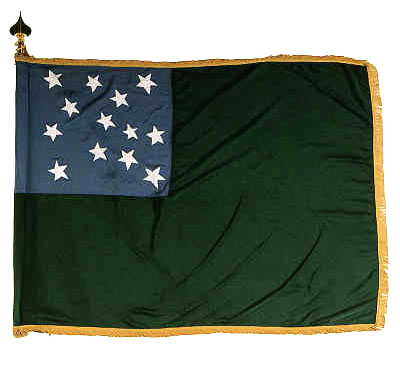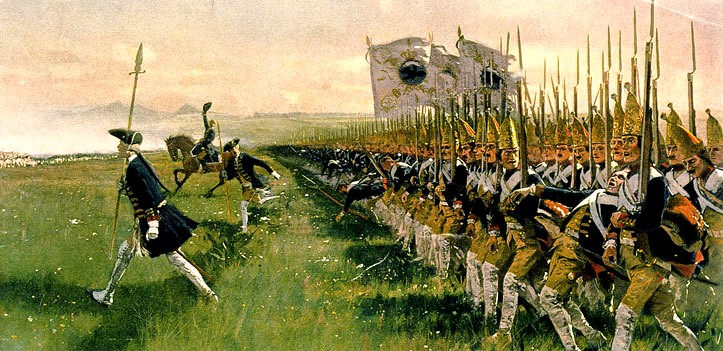Ethan Allen (January 21, 1738—February 12, 1789) may be best known as the father of Vermont, but he was also a Revolutionary War hero in his own right. He was born in rural Connecticut and raised as a farmer, but one with an impressive education that included philosophy. His experience as a farmer-led to him becoming interested in land speculating, and he purchased land in the New Hampshire Grants. In so doing, he became involved in legal disputes surrounding this territory, which was claimed by both the New York and New Hampshire colonies.
Allen got involved when the Green Mountain Boys formed to protect the Grants from New York. In fact, Allen became the leader of the group, and they began a campaign of intimidation and destruction of property to force the New York settlers off the Grant land. They were already deeply involved in this campaign when the Revolutionary War started.
Shortly after the battles of Lexington and Concord, Allen received a letter from a member of one of the Connecticut militias informing him they were going to capture Fort Ticonderoga in New York from the British and asked for his assistance. He agreed to bring the Green Mountain Boys to help. In his own account, Allen states his motive was patriotism, but it could also have been because it would improve New Hampshire’s claim to the Grant land by weakening New York’s. At any rate, 60 men from Connecticut and Massachusetts met with Allen and his Boys on May 2, 1775, to discuss the logistics of taking the fort. Allen was elected leader of the expedition the next day. The raid on the fort was planned for May 10, and two small regiments were sent to get boats to help them get to where they needed to be.

Flag of the Green Mountain Boys and the Vermont Republic
On May 9, Benedict Arnold arrived without notice to meet with the raiding party. This was long before his infamous betrayal of the colonies when he was still considered one of the top commanders of the Continental army. Arnold brought with him a commission from the Massachusetts Committee of Safety and informed the men he was the rightful leader of the expedition. The men refused Arnold’s leadership and said they would only follow Allen. Allen and Arnold met in private and worked out a solution of co-leadership of the raiding party. This meant they would both be at the front of the troops when they went to take the fort.
The raid on the fort went as planned, happening when most of the fort’s residents were asleep. The Raiders took the lone sentry by surprise, who woke up the fort’s British commander. When the commander saw Allen, Arnold, and all their men, he handed over his sword and surrendered Fort Ticonderoga without any violence to anyone on either side being done.
1875 engraving depicting the capture of Fort Ticonderoga by Ethan Allen on May 10, 1775
Allen’s fame in the Revolutionary cause was established quite firmly in this victory. However, his second Revolutionary endeavor did not go quite as well. In September 1775, he led an army to gain control of Montreal, which was not successful and resulted in him being captured by the British. He was put on a ship and sent to England, where he was, in his own words, treated very badly in his prison in Cornwall. The king decided that prisoner exchanges were a better method of dealing with these things, as many British soldiers and commanders had been captured by the colonists. Allen was put back on a ship and returned to New York City. A stop was made in Ireland on the way, where villagers in Cork learned the famous Ethan Allen was among them and took up donations to buy better food and clothing for him and the other American prisoners than the British were providing.
Once he was in New York City, Allen was granted limited parole as a colonial officer. This meant he could walk around the city on his own, but had to report daily to a British officer. While on parole, Allen’s brother Ira sent him money to pay to improve the conditions in which he was being kept and to buy him the luxuries he was used to. However, it was also during this parole that Allen learned of the death of one of his young sons, Thomas (one of Allen’s eight children among two wives) to smallpox. This caused Allen to become despondent for a while, and he wandered away from his parole post.
Wandering away, and his re-capture soon after meant Allen was put in solitary confinement and not allowed to roam the city unattended. It didn’t matter much in the long run, as Allen was released very soon after this incident, being exchanged for a British prisoner in 1778.
After being repatriated, Allen reported to George Washington at Valley Forge, where Washington made Allen a colonel in the Continental army on May 14, 1778. Washington cited Allen’s “fortitude, firmness, and zeal in the cause of his country, manifested during his long and cruel captivity, as well as on former occasions.” Allen was granted military pay of $75 a month. His new rank, however, meant there was no active role for him in the war unless called upon to do something. As he was never called upon, his payments were eventually discontinued.
After being made a colonel and released to return home, Allen went back to the Grants, which had declared independence from either New York or New Hampshire in 1777, during Allen’s absence. The Grants were now the newly independent nation of Vermont. Allen resumed political activity in Vermont, assisting the new, tiny nation in its ongoing dispute for control over the territory with New York. Once New York backed off, Allen was instrumental in efforts by the leadership of Vermont to be recognized as a nation by the Continental Congress. He also participated in negotiations with Great Britain for the possibility of Vermont becoming a British province.
Ethan Allen died at the age of 50, after losing his first wife and eldest daughter, remarrying, and having three more children by his second wife (the last one being born posthumously). He died at his home in Burlington, Vermont, which was part of the original Grant land he purchased. Though he died two years before Vermont was admitted to the new United States as its first state that wasn’t an original colony, he is still considered the father of Vermont because of his efforts to make it free and was honored as such after his death. Vermont still honors him and his name is practically synonymous with the state he helped create.
- The flag of the Green Mountain Boys (Wikipedia)
- 1875 engraving depicting the capture of Fort Ticonderoga by Ethan Allen on May 10, 1775 (Wikipedia)






